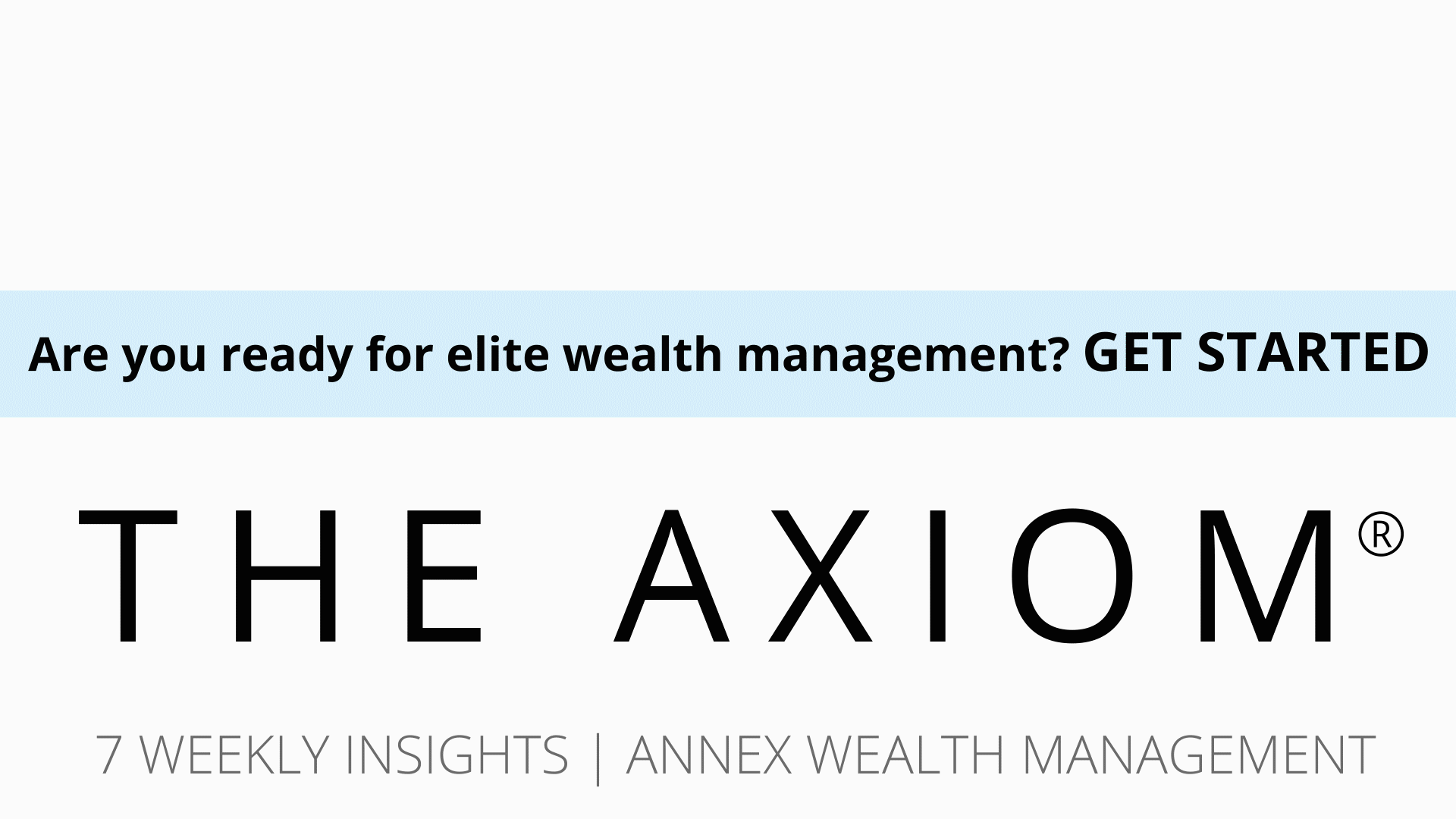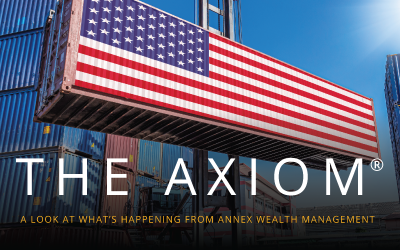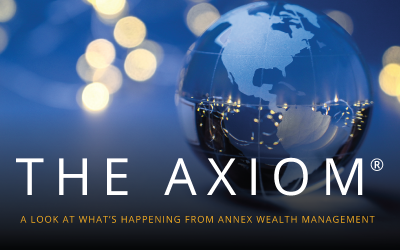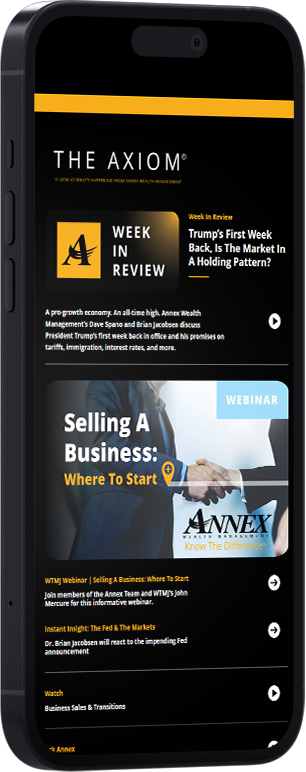
Axiom | Vol 277
Fed Moves From Defining Inflation As “Transitory”
Oops! We could not locate your form.

Meet The Axiom®’s Guest Editor: Brandon Arps, CFP®
I’m Brandon Arps, a Wealth Manager at Annex.
I meet with individuals and families that are both clients as well as those interested in learning more about Annex’s comprehensive wealth management. Working with clients gives the Annex team the chance to review their Investment, Tax, Estate, and Financial Plan; helping to ensure that they are on track to meet their personal retirement goals – as well as other aspirational dreams they may have outside of retirement. The most rewarding part of my role as Wealth Manager is learning about our clients and what’s important to them, which allows our teams to create bespoke action plans.
I live in Pewaukee with my wife and two stepsons, who keep us very busy with their active sports schedules. We also recently found out that we will be growing our family by one more next March – we couldn’t be more excited!
BACK TO TOP ↑

“My favorite section of the Axiom is “Week in Review.” Our Investment Team brings a remarkable amount of expertise to this weekly section, with a quick yet thorough summary of all things impactful to markets. It’s great to have a resource like this available whenever you’re ready to listen. For me, that’s usually after the kids are in bed.“
– Guest Editor: Brandon Arps, CFP® | Wealth Manager
________________________________________
Fed Moves From Defining Inflation As “Transitory”
Investors are currently still enjoying relatively good earnings and low interest rates. But the Fed may move to contain or reduce inflation with some moves in the near future. Annex Wealth Management’s Dave Spano and Derek Felske discuss.
BACK TO TOP ↑

Poll Recap | Opinion: What Are Your Thoughts On This?
To help alleviate supply chain issues, California ports and a number of retail and logistic companies will operate 24/7. In a recent poll we asked you what you thought. Here were your top two responses:
1. “Good idea, but what about the trucker shortage?”
Your most popular response – chosen by nearly 1/3 of polltakers – indicated many of you believe unloading more cargo at the ports will not completely solve the problems plaguing the supply chain. Accompanying the port crisis is a trucking crisis, a problem we addressed in this Know The Difference Minute: https://youtu.be/4T3awZ7S3rw
2. “It’s fine, but this will take longer than anyone plans.”
Your second most popular poll response addresses the time it will take to “detangle” the mess we’re in. Pickup slots are already going unused, according to a report in the Wall Street Journal. “We are open 90 hours a week now with 60% utilization,” said Sal Ferrigno, vice president of SSA Terminals, Long Beach.¹
There’s no easy solution to this massive problem, and it contributes to so many aspects of our lives. We will have to be patient as supply and prices vary in the coming months. And when it comes to Christmas gifts, experts suggest shopping early and buying local.
1. https://www.truckinginfo.com/10153954/will-bidens-24-7-port-plan-alleviate-supply-chain-problems
BACK TO TOP ↑

Halloween MoneyDo Estate Planning: Control Beyond the Grave
We often get questions like, “How can I control the legacy and inheritance I leave for my family, so they are protected and spend it appropriately?” Admittedly that’s a loaded question and often requires a longer discussion about what the questioner is trying to accomplish, and why and whether there are concerns about the people they’re leaving money to – for any variety of reasons.
Once we’ve dug into the concerns a bit more, there are times when it is very appropriate to think about having control of your financial legacy after you pass away.
This week’s MoneyDo is to evaluate your beneficiaries to determine if they really do need more support and guidance from you upon receiving their inheritance. If they do, you may want to update the estate plan to have more control over your assets and legacy after you pass away.
Many estate plans provide for an outright distribution of assets to heirs. Doing so, gives the beneficiaries full control over their inheritance to use, spend or save as they see fit. Alternatively, limits can be placed on an inheritance, generally done by using trusts for the various beneficiaries, where the terms and condition upon which they can use the money are outlined. Just in time for the Halloween season, doing so is often referred to as “Dead Hand Control” as you are continuing to control your wealth from beyond the grave!
While “Dead Hand Control” may sound less than ideal or more controlling than you want it to be, there are some situations where you should strongly consider using trusts with terms and conditions rather than leaving money directly to a beneficiary.
If you plan to leave money to any of the following people, you should consider creating trusts for their benefit:
- Young or Minor Beneficiaries – individual under the age of 18 cannot legally own assets so they need someone to do that on their behalf until they are no longer minors, but even then, do you want to turn over a large inheritance to an 18-year-old?
- Special Needs Beneficiaries that are receiving governmental benefits -Leaving money directly to these individuals may disqualify them from those benefits until the inheritance is fully spent.
- Beneficiaries with addiction issues – Could you be endangering an individual if he or she has a history of addiction by giving them a large sum of money?
- Beneficiaries that are not good with managing money or have significant creditors – Are you concerned that the inheritance would be spent quickly or used to satisfy old debts of the beneficiary?
- Beneficiaries that may get divorced in the future – Without planning by you and likely your beneficiary, an inheritance prior to a divorce could end up in the hands of a soon to be ex-in-law. Likely not what you have in mind for your family.
Whatever you ultimately decide, it is critical to work with an estate planning attorney to ensure you understand the impact of your estate plan, the terms and conditions that will carry out your estate planning goals, and how to properly educate your beneficiaries about your legacy.
BACK TO TOP ↑

This week’s Ask Annex comes from James, who asks:
“Do I need to take an RMD this year? If so, what’s the best time to take it?“
___________________________
We asked Annex Wealth Management’s Eric Strom, CFP®:
There have been a number of changes to the rules regarding required minimum distributions (RMDs) over the last few years. As you may recall, the CARES Act waived RMDs in 2020. However, RMDs are once again required in 2021. Because of the SECURE Act of 2019, RMDs now begin at age 72 for those born after June 30, 1949.
For those who haven’t started RMD’s yet, you will be faced with this obligation starting in the year you turn age 72. Distributions are required from traditional IRAs and certain employer-sponsored retirement accounts such as 401(k)s, 403(b)s, or 457(b)s.
Some investors like to take their RMD towards the end of the year to let their account grow tax-deferred for as long as possible before taking funds out. One unexpected downside to waiting is that you leave your heirs with a small window to take RMDs if you died during the year. You can alleviate this concern by taking your RMD early in the year. Another advantage of taking it early is to avoid any penalties that can be incurred by forgetting to take your RMD.
The IRS imposes a whopping 50% penalty on any portion of the RMD that is not taken by the end of the year. For example, if you have an $8,000 RMD and you don’t take the distribution by year-end, you would be subject to a $4,000 penalty.
Contact your financial professional today to ensure your RMD has been taken and avoid unwanted penalties. If you’re an Annex client, we’re ready to answer your questions. Getting your distribution request in early allows time to double-check that your RMD has been satisfied and to make any necessary adjustments before the end of the year.
Eric Strom, CFP®
Financial Planning Manager
BACK TO TOP ↑

At Annex Wealth Management, we’ll help you evaluate protection needs and determine the most efficient methods to address risks as a part of your comprehensive financial plan. We can help review your existing policies, and when needed, connect you with professional resources we trust to address your insurance needs.
- Comprehensive reviews of existing life insurance, annuities, long-term care insurance or other products
- Insurance planning specific to high-net-worth families and individuals
- Self-insuring as a strategy
- Advanced life insurance planning
- Property and casualty insurance review with our dedicated insurance partners
BACK TO TOP ↑


KNOW THE DIFFERENCE MINUTE:
Squid Game: Netflix’s Most Popular Show, Ever
KNOW THE DIFFERENCE MINUTE:
September US Homebuilding Drop Amid Labor & Material Shortages
ANNEX RADIO
What’s Inflation? | Inflation Definition
BACK TO TOP ↑

Annex Wealth Management provides free workshops, open to the public, on key wealth management topics.
Each week, we provide links to register for upcoming events.
BACK TO TOP ↑






